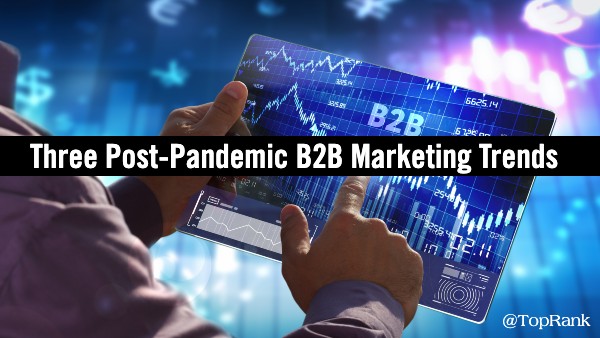
For many, the past few months have opened up giving us a taste of “return to normal” but what does that mean?
When most people say normal, what they often mean is comfortable. In the business world pre-pandemic comfortable is a dangerous place to be.
Any company that did not adjust, adapt or pivot over the past year and a half probably isn’t in business or doing as much business as they should. There have been many changes during the pandemic from digital transformation across all aspects of business to evolving expectations of customers. Companies and their marketers must be in tune with all of these changes in order to survive and thrive in a post-pandemic business environment.
One way customers have changed in B2B is that they expect more from the digital experience. Recent research shows 90% of B2B buyers will turn to a competitor if a suppliers digital channel doesn’t meet their needs. The elevation of expectations extends to service as well. “Expectations for experience have gotten so high that our traditional means of customer service simply aren’t sufficient anymore.” says Vivek Ahuja in a piece on Forbes.
Marketing is no different and the experiences companies create through their marketing are more important than ever.
As the former Salesforce chief marketing officer Kraig Swensrud, who is now co-founder of Qualified.com says, B2B marketers must prioritize “personalized, real-time experiences” to win over decision-makers who are increasingly digital-first.
There are important connections to be made between changes born of the pandemic and the trends that B2B brands need to be aware of as we enter the next phase marketing for 2H 2021 and into 2022.
Experience is Everything
“Research shows a strong correlation and interconnectedness between brand experience, customer experience and employee experience.” Forrester
Digital first B2B buyers expect continuity across channels for the information they seek as they pull themselves from awareness to consideration to decision in the sales journey. B2B brands that have adapted their marketing for digital first buyers must deliver best answer experiences that are both findable and credible.
Being the best answer for your customers with content that is comprehensive, relevant, engaging and actionable is more important than ever as competition for digital attention rises in B2B communication channels.
Optimizing best answer content experiences by making them easy to find and relevant is something many B2B marketers are tackling through renewed focus on SEO. Being found is a great start, but being found and trustworthy is even better. That’s why it is more timely than ever for B2B marketers to integrate efforts to optimize content for findability and credibility by incorporating influencers.
Many successful B2B marketers have already made this connection between SEO and influence when creating content experiences for customers. In our research for the State of B2B Influencer Marketing, we found that 50% of B2B marketers surveyed are integrating influencer marketing with SEO. We also found that there is a connection between the elevated credibility of content from trusted industry experts and the experiences B2B brands are so focused on. 74% of B2B marketers believe that influencer marketing impacts both prospect and customer experiences with the brand.
Content Really is King
“The average number of buying interactions has risen from 17 to 27 and 60% of purchases have 4+ people involved.” Forrester
Those interactions are powered by content. As B2B marketers have shifted much of their marketing efforts to digital, content plays a more important role in delivering information and experiences that satisfy the buyer’s intent. And there’s more buyers involved in the process creating even more reasons to produce highly relevant, engaging and trusted content.
While many marketers are already challenged to create enough content, our research found that by partnering with industry experts, content credibility and reach objectives are both positively affected. In fact, 70% of B2B marketers say influencers improve the credibility of brand content and 75% say influencers help drive more views of brand content.
The transformation of B2B to digital means B2B marketers must approach content intelligently and not alone. Partnering with the voices in the industry that have the trust and attention of the customers helps create a quantity of quality content that has credibility and reach that brands are having a hard time achieving on their own.
Executive Influence Drives Sales
“Salespeople must become recognized thought leaders in their fields and contribute to digital conversations in new and provocative ways.” Harvard Business Review
The value of influence for B2B brands is not limited to salespeople. In fact, there’s value in every public facing executive at a B2B brand to grow their influence in the industry and help drive revenue outcomes. Many B2B key opinion leaders and subject matter experts within companies may not have sales responsibilities, but the trust in their expertise can help create confidence in the brand and those who are tasked with sales.
Some B2B marketers area already seeing lift in lead generation and sales by working with industry influencers. For example, our survey of hundreds of B2B marketers found that 53% of B2B marketers have increased leads by working with influencers. 34% say their work with influencers have increased sales.
So why limit the value of influence to only working with external influencers? Why not develop the influence of appropriate subject matter experts and executives within the brand as well?
In fact, many B2B brands are finding the combination of developing social influence of their executives can be facilitated by partnering those internal opinion leaders with external industry experts. Whether it’s content co-creation, a LinkedIn Live event, webinar Twitter Spaces or Clubhouse chat, podcast interview or recorded video, there are many opportunities for B2B brands the create mutual value and lift for their executives in partnership with industry experts that can result in those internal executives having more influence on prospects and customers.
There are more than enough emerging technology trends happening with the transformation of B2B marketing and business to digital first. But there is a human side to B2B marketing that has too often been overlooked in the past. If there’s one thing that past 18 months has taught us as we’ve come to know our business customers better than ever, is that the human connection – the customer experience, the value of content and the power of your own executives being influential all play important roles in connecting with customers in ways they expect and are necessary.



